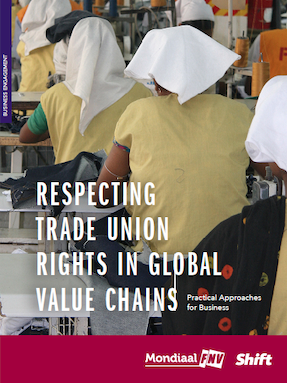Between 2010-2014, the Peruvian fruit growing company Composol was in ceaseless conflict with its workers and their union representatives. It had strong turnover of staff, low motivation among those remaining, and, according to its own accounts, very high litigation cost due to constant cases before the labor courts. The company’s labor troubles were even featured as a prominent case example in complaints filed by Peruvian and international unions with the US Department of Labor and the European Commission related to beneficial trade agreements.
It was not until 2014 that the company started to realize how much of an impact this was having on its business, and decided more meaningful action was necessary. Together with local and internationally focused unions and business associations, the company embarked on a path towards fully embracing social dialogue and trade union rights. Through a process of trust-building, negation training and capacity building on labor rights -among others- the company and unions were able to fundamentally transform their relationship. In addition to more satisfied workers and meeting company commitments, results also included lowered costs in recruitment, transportation and legal fees, among many others.In the words of Javier Morales, Camposol’s Managing Director of the Fruit and Vegetable Division: “We have been able to be profitable while focusing on people. (…) Now workers come to Camposol because they choose to, not because they have to as in the past. Competitors are raising the salaries to attract workers more but it is not the only thing that workers seek. What they seek is also a healthy emotional relationship with their employer. We demonstrate that we can align the interests of workers and shareholders.” Perhaps most central to turning things around was the realization that in order to ensure respect for trade union rights companies need to take proactive steps to realize them in practice. This, in a nutshell, is the key message of our newest publication ‘Respecting Trade Union Rights in Global Value Chains’, developed with Mondiaal FNV, to help companies approach trade union rights proactively.

What are trade union rights?
What are trade union rights?
Freedom of association and the rights to collective bargaining (collectively referred to in the publication as “trade union rights”) are recognized by the International Labour Organisation (ILO) as one of a set of four core labor standards that all governments and companies should adhere to. While they are fundamental rights in and of themselves, trade union rights are also recognized as “enabling rights,” meaning that respecting these rights can often lead to the fulfillment of a number of other labor rights, including adequate wages, reasonable working hours, workplace safety, and a work environment free from discrimination and harassment.
Action on trade union rights is hard…
Those who have worked on trade union rights know that this is all easier said than done.
While many companies list respect for trade union rights in their policy commitments, pledge to adhere to industry standards, and participate in multi-stakeholder initiatives, many still struggle to identify and implement meaningful action to address the risks to trade union rights in their global value chains.
In our work with Mondiaal FNV we recognized three categories of barriers that often create challenges for global companies to ensure respect for trade union rights in their global operations and value chains:
- External factors: Respecting trade union rights in many contexts can be extremely challenging: local laws may prohibit them, union-relations may be seen to be political, and local business partners may not see the value in changing what already works.
- Business models and practices: some companies have risks embedded in how they are structured or in how they operate. For instance, extensive reliance on contract labor, or sourcing strategies that rely upon production in markets with lower labor costs and often weaker labor protections.
- Internal company governance and due diligence pitfalls: a number of challenges arise from weaknesses in corporate governance and due diligence. For example, a lack of understanding of trade union rights, limited visibility into conditions in the supply chain, or strong commitments on paper not being translated into action on the ground.
Our publication provides a detailed diagnostic tool with simple questions to help companies identify the specific barriers they might face in a particular context or relationship.
… but there are ideas and experiences to inspire action
We have seen that those companies who identify their salient human rights issues (one of the practical steps the publication suggests) now often include freedom of association and right to collective bargaining among them. I believe it reflects a broader understanding of how interconnected human rights impacts are and that one of the most sustainable ways to improve human rights for workers—in a way that also brings benefits to business—is to give workers a voice and take proactive steps to reduce barriers and reinforce constructive relationships that enable them to organize, make their voice heard and take a stake in the long-term interest of the company.
But identifying trade union rights as important is only the first step. We need to move to action. Our work with companies on these issues has surfaced a range of practical approaches companies are taking to address these barriers in new and meaningful ways. Whether it is the Freedom of Association protocol that was developed by apparel and footwear companies with local suppliers and stakeholders in Indonesia to address the locally challenging context for trade union rights or the way that companies have collaborated in Mexico to jointly apply leverage to improve union relations.
Different types of approaches are almost certainly going to be necessary to address the range of situations a company might face and the different types of barriers that may be present. The resource offers a continuum of different types of leverage that can be applied internally and externally, with practical case examples to illustrate these approaches in practice: for example, working jointly with peer companies and international and local trade unions to advance collective bargaining to improve living wages in the garment sector, or exerting collective leverage with peers vis-à-vis a government to improve laws and regulations that protect trade union rights (both of which have concrete case examples in the publication).
Our aim is to inspire companies with ideas for concrete action, to move from recognizing risks to trade union rights to taking meaningful action to address those risks, by drawing from a menu of potential options for action. We hope it can provide companies with a roadmap for developing thoughtful, meaningful and targeted actions necessary to tackle these issues more effectively in practice.

 By David Vermijs
By David Vermijs




